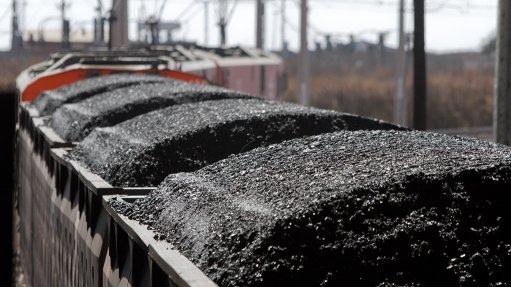
Photo by: Creamer Media
Although there has been a “slight” improvement year-on-year in terms of State-owned Transnet Freight Rail’s (TFR’s) North Corridor performance, the beleaguered rail operator is “not out of the woods yet”, TFR North Corridor acting managing executive Theo Johnson has said.
“'Slight improvement’ is a term that I would accept. We're working on a lot of initiatives [in] the North Corridor, because that's the biggest corridor in TFR, particularly for the export coal line . . . but we are not out of the woods. We have a long way to go,” he said at the 2024 Coal & Energy Transition Day, in Johannesburg, on July 24.
He referred to progress made through a mutual cooperation agreement between TFR and the private-sector-owned Richards Bay Coal Terminal (RBCT) since November last year, which saw the public-private partnership procure locomotive spares in the form of batteries and compressors.
“I’m happy to inform that those are in, and we are seeing the benefits,” Johnson said.
He noted that the train failures were also steadily reducing while cycle times improved.
“When we started the financial year [in April], our cycle times were hovering around 92 hours towards RBCT. Our latest stats [show] we are at about 80 hours at the moment in terms of transit times and total cycle times,” Johnson added.
However, he acknowledged ongoing problems with security and derailments, two of which occurred earlier in the year, noting that, if TFR wanted to fill the 60-million-tonne capacity on the line to the RBCT, more work would need to be done.
The North Corridor handles about 41% of TFR’s total volumes and supports the bulk transport of key commodities including export coal and chrome ore. The company fell about 12-million tonnes short of the total RBCT-bound export coal capacity in the financial year ending March 31.
“As at [June], we were sitting at just over 47-million tonnes, so it’s pretty much on par. [However], in July, it's the first month where we're averaging a 55-million-tonne rate, which is positive. So, it’s going in the right direction,” RBCT CEO Alan Waller added.
However, he said that, outside of the impact that TFR’s extended poor performance has had on RBCT’s financials, the terminal has also suffered reputational damage owing to the poor public perception caused by the large numbers of coal trucks on the roads.
“[There is a] perception that the increased trucking in Richards Bay is because of RBCT, when RBCT doesn't receive a single road truck into its operation,” Waller remarked.
However, he acknowledged that there was a high degree of cooperation between the industry and TFR in terms of minimising turnaround times and restoring capacity.
“Are we happy with where we are? No. Do we see the green shoots? Yes. There are some good projects in the pipeline that could unlock capacity, but none of them are short term [and] none of them are overnight fixes to the situation. So, we've still got a bit of a rough ride for the next 6 to 12 months, I believe,” Waller said.